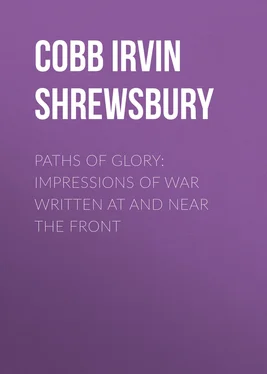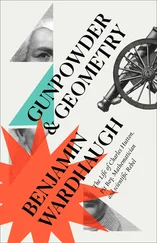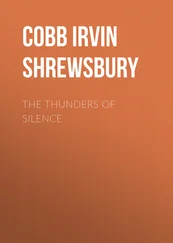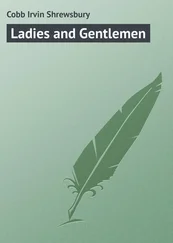Irvin Cobb - Paths of Glory - Impressions of War Written at and Near the Front
Здесь есть возможность читать онлайн «Irvin Cobb - Paths of Glory - Impressions of War Written at and Near the Front» — ознакомительный отрывок электронной книги совершенно бесплатно, а после прочтения отрывка купить полную версию. В некоторых случаях можно слушать аудио, скачать через торрент в формате fb2 и присутствует краткое содержание. Жанр: prose_military, История, foreign_edu, foreign_antique, foreign_prose, на английском языке. Описание произведения, (предисловие) а так же отзывы посетителей доступны на портале библиотеки ЛибКат.
- Название:Paths of Glory: Impressions of War Written at and Near the Front
- Автор:
- Жанр:
- Год:неизвестен
- ISBN:нет данных
- Рейтинг книги:3 / 5. Голосов: 1
-
Избранное:Добавить в избранное
- Отзывы:
-
Ваша оценка:
- 60
- 1
- 2
- 3
- 4
- 5
Paths of Glory: Impressions of War Written at and Near the Front: краткое содержание, описание и аннотация
Предлагаем к чтению аннотацию, описание, краткое содержание или предисловие (зависит от того, что написал сам автор книги «Paths of Glory: Impressions of War Written at and Near the Front»). Если вы не нашли необходимую информацию о книге — напишите в комментариях, мы постараемся отыскать её.
Paths of Glory: Impressions of War Written at and Near the Front — читать онлайн ознакомительный отрывок
Ниже представлен текст книги, разбитый по страницам. Система сохранения места последней прочитанной страницы, позволяет с удобством читать онлайн бесплатно книгу «Paths of Glory: Impressions of War Written at and Near the Front», без необходимости каждый раз заново искать на чём Вы остановились. Поставьте закладку, и сможете в любой момент перейти на страницу, на которой закончили чтение.
Интервал:
Закладка:
To me a monoplane always suggests a bird when it does not suggest an insect or a winged reptile; and this monoplane particularly suggested the bird type. The simile which occurred to me was that of the bird which guards the African rhinoceros; after that it was doubly easy to conceive of this army as a rhinoceros, having all the brute strength and brute force which are a part of that creature, and its well-armored sides and massive legs and deadly horned head; and finally its peculiar fancy for charging straight at its objective target, trampling down all obstacles in the way.
The Germans also fancy their monoplane as a bird; but they call it Taube—a dove. To think of calling this sinister adjunct of warfare a dove, which among modern peoples has always symbolized peace, seemed a most terrible bit of sarcasm. As an exquisite essence of irony I saw but one thing during our week-end in Louvain to match it, and that was a big van requisitioned from a Cologne florist's shop to use in a baggage train. It bore on its sides advertisements of potted plants and floral pieces—and it was loaded to its top with spare ammunition.
Yet, on second thought, I do not believe the Prussians call their war monoplane a dove by way of satire. The Prussians are a serious-minded race and never more serious than when they make war, as all the world now knows.
Three monoplanes buzzed over us, making sawmill sounds, during the next hour or two. Thereafter, whenever we saw German troops on the march through a country new to them we looked aloft for the thing with the droopy wings and the black cross on its yellow abdomen. Sooner or later it appeared, coming always out of nowhere and vanishing always into space. We were never disappointed. It is only the man who expects the German army to forget something needful or necessary who is disappointed.
It was late in the afternoon when we bade farewell to the three-hundred- pound proprietress of the Belgian Lion and sought to reach the center of the town through byways not yet blocked off by the marching regiments. When we were perhaps halfway to our destination we met a town bellman and a town crier, the latter being in the uniform of a Garde Civique. The bellringer would ply his clapper until he drew a crowd, and then the Garde Civique would halt in an open space at the junction of two or more streets and read a proclamation from the burgomaster calling on all the inhabitants to preserve their tranquillity and refrain from overt acts against the Germans, under promise of safety if they obeyed and threat of death at the hands of the Germans if they disregarded the warning.
This word-of-mouth method of spreading an order applied only to the outlying sections. In the more thickly settled districts, where presumably the populace could read and write, proclamations posted on wall and window took its place. During the three days we stayed in Louvain one proclamation succeeded another with almost the frequency of special extras of evening newspapers when a big news story breaks in an American city: The citizens were to surrender all firearms in their possession; it would be immediately fatal to him if a man were caught with a lethal weapon on his person or in his house. Tradespeople might charge this or that price for the necessities of life, and no more. All persons, except physicians and nurses in the discharge of their professional duties, and gendarmes—the latter being now disarmed and entirely subservient to the military authorities—must be off the streets and public squares at a given time—to wit, nine p. m. Cafés must close at the same hour. Any soldier who refused to pay for any private purchase should be immediately reported at headquarters for punishment. Upper front windows of all houses on certain specified streets must be closed and locked after nightfall, remaining so until daylight of the following morning; this notice being followed and overlapped very shortly by one more amplifying, which prescribed that not only must front windows be made fast, but all must have lights behind them and the street doors must be left unlocked.
The portent of this was simple enough: If any man sought to fire on the soldiers below he must first unfasten a window and expose himself in the light; and after he fired admittance would be made easy for those who came searching for him to kill him.
At first these placards were signed by the burgomaster, with the military commandant's indorsement, and sometimes by both those functionaries; but on the second day there appeared one signed by the commandant only; and this one, for special emphasis, was bounded by wide borders printed in bright red. It stated, with cruel brevity, that the burgomaster, the senator for the district and the leading magistrate had been taken into custody as hostages for the good conduct of their constituents; and that if a civilian made any attack against the Germans he would forfeit his own life and endanger the lives of the three prisoners. Thus, inch by inch, the conquerors, sensing a growing spirit of revolt among the conquered—a spirit as yet nowise visible on the surface—took typically German steps to hold the rebellious people of Louvain in hobbles. It was when we reached the Y-shaped square in the middle of things, with the splendid old Gothic town hall rising on one side of it and the famous Church of Saint Pierre at the bottom of the gore, that we first beheld at close hand the army of the War Lord. Alongside the Belgian Lion we had thought it best to keep our distance from the troops as they passed obliquely across our line of vision. Here we might press as closely as we pleased to the column. The magnificent precision with which the whole machinery moved was astounding—I started to say appalling. Three streets converging into the place were glutted with men, extending from curb to curb; and for an outlet there was but one somewhat wider street, which twisted its course under the gray walls of the church. Yet somehow the various lines melted together and went thumping off out of sight like streams running down a funnel and out at the spout.
Never, so far as we could tell, was there any congestion, any hitch, any suggestion of confusion. Frequently there would come from a sideway a group of officers on horseback, or a whole string of commandeered touring cars bearing monocled, haughty staff officers in the tonneaus, with guards riding beside the chauffeurs and small slick trunks strapped on behind. A whistle would sound shrilly then; and magically a gap would appear in the formation. Into this gap the horsemen or the imperious automobiles would slip, and away the column would go again without having been disturbed or impeded noticeably. No stage manager ever handled his supers better; and here, be it remembered, there were uncountable thousands of supers, and for a stage the twisting, medieval convolutions of a strange city. Now for a space of minutes it would be infantry that passed, at the swinging lunge of German foot soldiers on a forced march. Now it would be cavalry, with accouterments jingling and horses scrouging in the close-packed ranks; else a battery of the viperish looking little rapid-fire guns, or a battery of heavier cannon, with cloth fittings over their ugly snouts, like muzzled dogs whose bark is bad and whose bite is worse.
Then, always in due order, would succeed the field telegraph corps; the field post-office corps; the Red Cross corps; the brass band of, say, forty pieces; and all the rest of it, to the extent of a thousand and one circus parades rolled together. There were boats for making pontoon bridges, mounted side by side on wagons, with the dried mud of the River Meuse still on their flat bottoms; there were baggage trains miles in length, wherein the supply of regular army wagons was eked out with nondescript vehicles—even family carriages and delivery vans gathered up hastily, as the signs on their sides betrayed, from the tradespeople of a dozen Northern German cities and towns, and now bearing chalk marks on them to show in what division they belonged. And inevitably at the tail of each regiment came its cook wagons, with fires kindled and food cooking for supper in the big portable ranges, so that when these passed the air would be charged with that pungent reek of burning wood which makes an American think of a fire engine on its way to answer an alarm.
Читать дальшеИнтервал:
Закладка:
Похожие книги на «Paths of Glory: Impressions of War Written at and Near the Front»
Представляем Вашему вниманию похожие книги на «Paths of Glory: Impressions of War Written at and Near the Front» списком для выбора. Мы отобрали схожую по названию и смыслу литературу в надежде предоставить читателям больше вариантов отыскать новые, интересные, ещё непрочитанные произведения.
Обсуждение, отзывы о книге «Paths of Glory: Impressions of War Written at and Near the Front» и просто собственные мнения читателей. Оставьте ваши комментарии, напишите, что Вы думаете о произведении, его смысле или главных героях. Укажите что конкретно понравилось, а что нет, и почему Вы так считаете.












